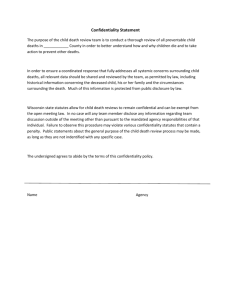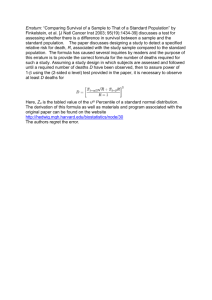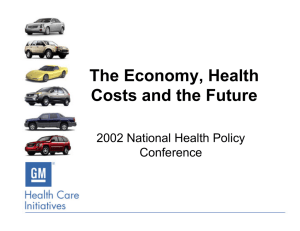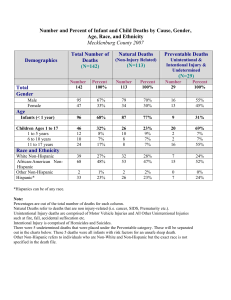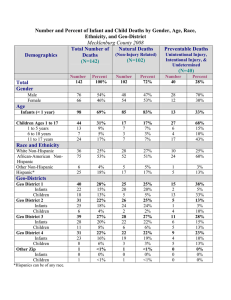R HOT TOPICS
advertisement
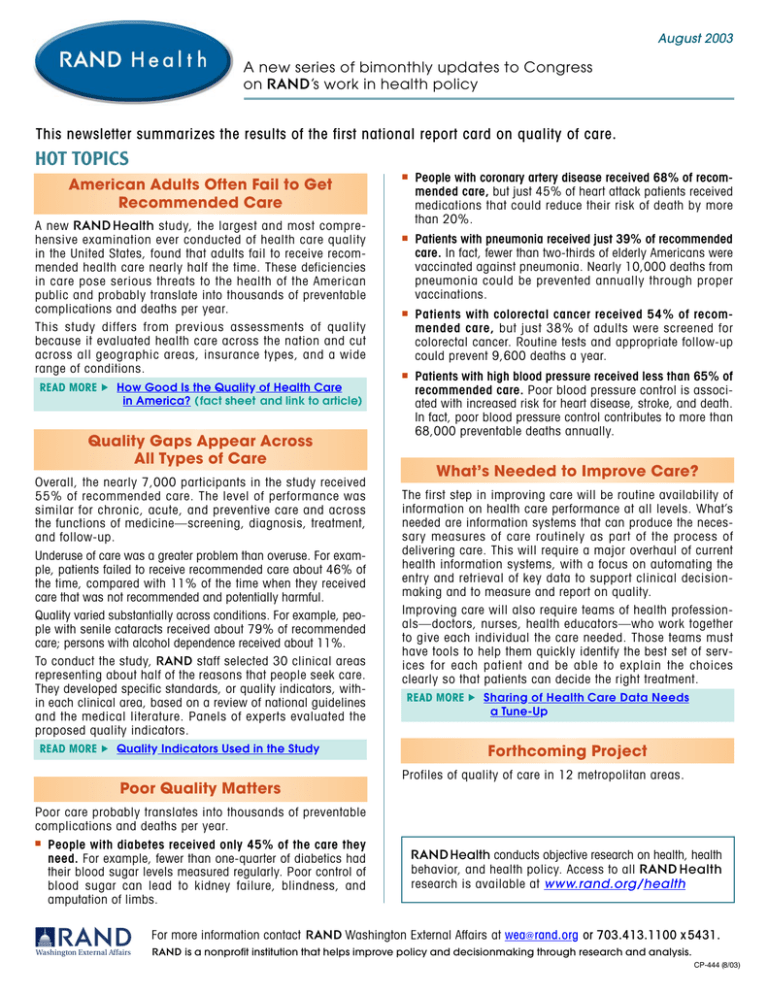
August 2003 A new series of bimonthly updates to Congress on R’s work in health policy This newsletter summarizes the results of the first national report card on quality of care. HOT TOPICS American Adults Often Fail to Get Recommended Care A new R Health study, the largest and most comprehensive examination ever conducted of health care quality in the United States, found that adults fail to receive recommended health care nearly half the time. These deficiencies in care pose serious threats to the health of the American public and probably translate into thousands of preventable complications and deaths per year. This study differs from previous assessments of quality because it evaluated health care across the nation and cut across all geographic areas, insurance types, and a wide range of conditions. ▲ READ MORE How Good Is the Quality of Health Care in America? ( fact sheet and link to article) Quality Gaps Appear Across All Types of Care ▲ READ MORE Quality Indicators Used in the Study People with coronary artery disease received 68% of recommended care, but just 45% of heart attack patients received medications that could reduce their risk of death by more than 20%. ■ Patients with pneumonia received just 39% of recommended care. In fact, fewer than two-thirds of elderly Americans were vaccinated against pneumonia. Nearly 10,000 deaths from pneumonia could be prevented annually through proper vaccinations. ■ Patients with colorectal cancer received 54% of recommended care, but just 38% of adults were screened for colorectal cancer. Routine tests and appropriate follow-up could prevent 9,600 deaths a year. ■ Patients with high blood pressure received less than 65% of recommended care. Poor blood pressure control is associated with increased risk for heart disease, stroke, and death. In fact, poor blood pressure control contributes to more than 68,000 preventable deaths annually. What’s Needed to Improve Care? The first step in improving care will be routine availability of information on health care performance at all levels. What’s needed are information systems that can produce the necessary measures of care routinely as part of the process of delivering care. This will require a major overhaul of current health information systems, with a focus on automating the entry and retrieval of key data to support clinical decisionmaking and to measure and report on quality. Improving care will also require teams of health professionals—doctors, nurses, health educators—who work together to give each individual the care needed. Those teams must have tools to help them quickly identify the best set of services for each patient and be able to explain the choices clearly so that patients can decide the right treatment. READ MORE ▲ Overall, the nearly 7,000 participants in the study received 55% of recommended care. The level of performance was similar for chronic, acute, and preventive care and across the functions of medicine—screening, diagnosis, treatment, and follow-up. Underuse of care was a greater problem than overuse. For example, patients failed to receive recommended care about 46% of the time, compared with 11% of the time when they received care that was not recommended and potentially harmful. Quality varied substantially across conditions. For example, people with senile cataracts received about 79% of recommended care; persons with alcohol dependence received about 11%. To conduct the study, R staff selected 30 clinical areas representing about half of the reasons that people seek care. They developed specific standards, or quality indicators, within each clinical area, based on a review of national guidelines and the medical literature. Panels of experts evaluated the proposed quality indicators. ■ Sharing of Health Care Data Needs a Tune-Up Forthcoming Project Profiles of quality of care in 12 metropolitan areas. Poor Quality Matters Poor care probably translates into thousands of preventable complications and deaths per year. ■ People with diabetes received only 45% of the care they need. For example, fewer than one-quarter of diabetics had their blood sugar levels measured regularly. Poor control of blood sugar can lead to kidney failure, blindness, and amputation of limbs. R Washington External Affairs For more information contact R Health conducts objective research on health, health behavior, and health policy. Access to all R Health research is available at www.rand.org/health R Washington External Affairs at wea@ rand.org or 703.413.1100 x 5431. R is a nonprofit institution that helps improve policy and decisionmaking through research and analysis. CP-444 (8/03)
